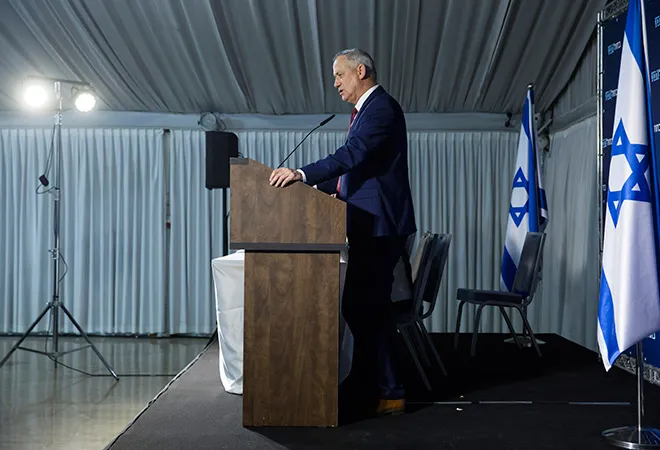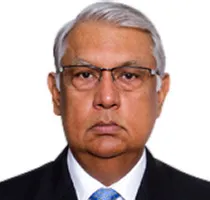-
CENTRES
Progammes & Centres
Location

Defying odds and popular perception, Israel will have a new government, led by former Israeli Defence Force
Netanyahu's Likud Party got the largest number of seats in this round of elections but could not muster more than 58 seats with his alliance partners, mostly smaller religious and nationalist allies Netanyahu has been in office since 2009 and was earlier PM from 1996-99, He has the distinction of being Israel’s longest serving PM. I recall his taking over as PM when I was serving in the Indian Embassy in Tel Aviv from 1995 to early 1999.
Netanyahu is also facing prosecution in three corruption cases, which now have been put on hold in view of the Covid 19 pandemic. Israel has more than 350 confirmed cases, and Netanyahu had telephoned PM Modi to allow export of masks to Israel after the Indian government banned exports. Israel has had a caretaker government for almost a year. The caretaker government is constrained in approving certain budgets and introducing some kinds of legislation. Despite emerging as the largest party, the Likud was unable to form a government with its coalition parties as it could not muster more than 58 members in the Knesset.
Benny Gantz leads the Kahol Lavan or the Blue and White Alliance which has to now formalise a coalition. Gantz has undertaken “do whatever it takes to form within as few days as possible a national, patriotic and broad government”. Success in this effort is not guaranteed in Israel’s fractious political landscape. He needs the support of 61 members of the 120-member Israeli parliament, the Knesset. He has not more than this number, leaving him with a razor thin majority. His potential coalition includes the Joint List of Arab parties which are ideologically at loggerheads with the Likud-led coalition and the Blue and White Party. Muslim Arabs comprise almost 21 percent of Israel’s population, with around 9 percent Druze and 9 percent Christians. Adding to this volatile political mix is the far-right party of Avigdor Lieberman, a former Defence Minister who has refused to back Netanyahu anymore. The million-dollar question is whether this develop into a working coalition.
Meanwhile, Gantz has proposed legislation that would prohibit Netanyahu from forming a government and limit any PM’s tenure to two terms, a provision similar to the that of the American presidency. Additionally, the legislation proposes ending the term of any PM if he or she has been indicted for any crime and prohibit any MP from participating in government formation if he or she is under indictment. A main reason for Gantz managing to get the support of 61 MPs is the corruption indictment of Netanyahu. This has led even the Joint Arab list to support Gantz making an exception to its default position of remaining in opposition.
The Covid 19 virus, though so far not caused any death in the country, has been playing a political role. Netanyahu has tried to leverage it by offering a 6-month National Unity government between Likud and Kahol Lavan or a 4-year coalition, with the PM’s position shared 50:50, between he and Gantz. The latter has refused to form a government with any leader facing corruption charges.
The political deadlock can be broken if Gantz succeeds in working out an understanding with the smaller parties like the Avigdor Lieberman-led Yisrael Beitenu, secular and ultra-nationalist in orientation and the Joint Arab List, representing Israel’s Arab minority. While campaigning, Gantz had ruled out cooperation in government formation with support from the Joint Arab List. He had to roll back from his position and to get the Joint Arab List members on board, committing to form a government that will “serve all of Israel’s citizens, Jews and Arab alike”.
The motivation of Israeli Arabs may well be to block Netanyahu, their political bête noire from getting another term as PM. Israeli Arabs are very unhappy with Netanyahu for embracing Trump’s Peace Plan which has been roundly rejected by the Palestinians. They are also angry with Trump’s move to relocate the US Embassy to Jerusalem and Israel’s Jewish settlements on Palestinian territory.
The next few weeks will, no doubt, be spent in intense horse-trading and there is no 100% guarantee that Gantz will succeed. The glue that brings together Gantz and his potential coalition partners is their shared dislike for Netanyahu. Given that Lieberman has called the Joint Arab List parties “terrorists”, the task of coalition formation may turn out to be a Sisyphean task.
Israel has had a unique political history. No single party has ever got a majority in the Knesset and all governments since Israel’s independence in 1948, have been coalition governments. Israel has the proportional representation system of election which is different from the first-past-the-post system in India. Political parties in Israel submit list of candidates, in order of priority, to the Election Commission. Depending upon the percentage of votes polled by each party, the Election Commission then allots the number of seats to each Party which sends that number of MPs to the Knesset according to the list submitted.
Israel has emerged as a strong partner for India. Under the government of PM Modi, ties with Israel have progressed in leaps and bounds. Both countries have witnessed a growing convergence on interests, both practical and ideological. Bilateral ties have been de-hyphenated from the Palestinian issue and relations with other Arab countries. The changed global environment and regional rivalry in West Asia, has facilitated India in crafting independent ties to Israel, Arab countries and Iran. Israel has merged as the 3rd largest supplier of military hardware. The latest contract with Israel is for Rs 900 crores for the supply of Light Machine Guns.
The views expressed above belong to the author(s). ORF research and analyses now available on Telegram! Click here to access our curated content — blogs, longforms and interviews.

Pinak Chakravarty was a Visiting Fellow with ORF's Regional Studies Initiative where he oversees the West Asia Initiative Bangladesh and selected ASEAN-related issues. He joined ...
Read More +